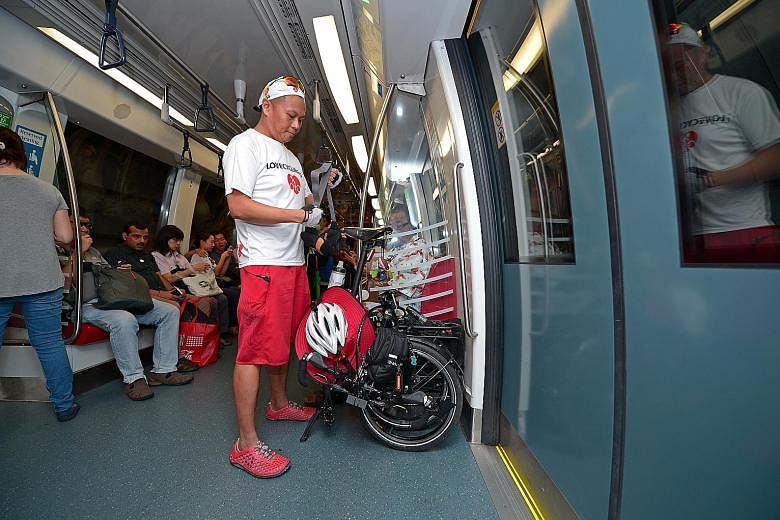A six-month trial to allow foldable bicycles and personal mobility devices (PMDs) all-day access on buses and trains will be launched soon, in what observers say is a significant step in encouraging people to commute by bicycle.
Transport Minister Khaw Boon Wan announced the upcoming pilot, which is likely to start later this year, at the Walk Cycle Ride SG Symposium held at the Mediacorp Campus yesterday.
Currently, foldable bicycles are allowed on public transport only during off-peak hours, thus limiting their use to mainly recreational purposes.
Non-foldable bicycles are not allowed at all, but foldable bikes can be taken on board buses and trains from 9.30am to 4pm and after 8pm on weekdays. All-day access is granted on weekends and public holidays.
Observers say lifting the restrictions on access will make it viable for people to cycle to work .
Hairstylist Kenneth Tham, who cycles to work, said it will allow users to ride to the train station from home or work. "I think, given the choice, people will do this," said the 42-year-old.
Cycling advocate Han Jok Kwang agreed, saying: "A 'foldie' doesn't take up a lot of space. It's no bigger than luggage you take to the airport."
Although there are no figures, cycling enthusiasts say foldable bikes, such as those by Brompton, are becoming increasingly popular because of their portability. Many members of the 14,000-strong group, LoveCyclingSG, own them.
Yesterday, Mr Khaw also addressed the concerns of commuters worried about sharing space with foldable bicycles and PMDs during rush hours, when he urged cyclists to refrain from entering buses and trains that are crowded.
"For this trial to be a success, public transport commuters and those who bring their bicycles and PMDs onto the buses and trains need to give and take, and be considerate of one another," he said.
Mr Simon Lane, SBS Transit's executive vice-president for rail, said at a panel discussion yesterday that if bicycle users were reasonable, there would be "plenty of space".
Mr Saktiandi Supaat, an MP for Bishan-Toa Payoh GRC, advised cyclists to be patient. "If it's crowded, don't push yourself in, wait for the next train," he said.
He also suggested that MRT stations could have dedicated areas for cyclists to wait to board, and trains could have specific carriages for those with bikes.
Another idea raised at the symposium was for buses to be equipped with bike racks, as they are in a number of cities in North America and Europe.
Yesterday, Mr Khaw also revealed that in the Jurong Lake District bicycle-sharing scheme to be launched next year, about 1,000 bikes will be distributed across 100 docking stations.
The stations will be within walking distance from one another and be available 24 hours a day, he said, adding that the Land Transport Authority will call a tender for the system's operator next week.
These two steps are the latest in Singapore's push to go car-lite.
Explaining why the traditional car-centric city model is not sustainable here, Mr Khaw said: "Cars require carparks, require roads, and both occupy large tracts of land. They are inefficiently used. For unlike public transport, private cars are typically used for only a very short period each day, and are left in the parking lots the rest of the time."
About 12 per cent of Singapore's land is used for roads, compared with 14 per cent for housing.
In addition, cars spend only about 4 per cent of the time in motion, according to a recent study by the Centre for Liveable Cities, a government think-tank, and the Urban Land Institute, a research organisation based in the United States.
"Cars will still have a role to play, but as shared cars, taxis and private-hire cars, rather than be largely privately owned," said Mr Khaw.


